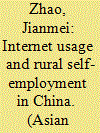| Srl | Item |
| 1 |
ID:
155829


|
|
|
|
|
| Summary/Abstract |
The advance of information and communication technologies (ICTs) has fundamentally changed the way people communicate and interact with each other, and the rise of the Internet profoundly affects political participation. In applying the latest Asian Barometer surveys, we discovered Internet-driven divergent effects on political participation, suggesting rising Internet usage is simultaneously associated with decreasing electoral and increasing activist participation. Further analysis revealed that the divergent effects can be explained by severe frustration with the political system and economic conditions. When considering state polity characteristics, we found that the Internet-driven divergent effects in a democratic context refer to a coincidence of two Internet-related effects that decrease electoral and increase activist participation; in an authoritarian context, they indicate a correlation between greater Internet usage and a preference for activist over electoral participation.
|
|
|
|
|
|
|
|
|
|
|
|
|
|
|
|
| 2 |
ID:
171003


|
|
|
|
|
| Summary/Abstract |
With the rapid development of information technology, the internet has penetrated rural China. In this article I examine the impact of internet usage on rural self-employment and investigate its major channels. Employing a semiparametric bivariate probit model, the research finds that internet usage significantly increases the probability of rural self-employment by 5 to 7 percentage points. Further evidence points to the significant impact of internet usage on male, older, and better educated rural laborers, whereas such an effect on female, younger, and less educated laborers is not remarkable. Channel investigation reveals that internet usage encourages rural self-employment by weakening financial constraints, lessening social capital restrictions, and reducing transaction costs.
|
|
|
|
|
|
|
|
|
|
|
|
|
|
|
|